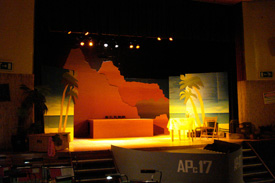 Open access Fringe festivals can be a great first step into producing work in the arts sector, and then producing a show. Whilst being part of a Fringe festival does not guarantee success in the arts world, it can help you on the way to success. Whether you are a professional or an amateur, you need to know why you are taking part in a Fringe show. For amateurs it can be a good way to gain exposure for your work, however for a professional it may be more about securing funding, building your reputation, and connecting with other artists, promoters and booking agents.
Open access Fringe festivals can be a great first step into producing work in the arts sector, and then producing a show. Whilst being part of a Fringe festival does not guarantee success in the arts world, it can help you on the way to success. Whether you are a professional or an amateur, you need to know why you are taking part in a Fringe show. For amateurs it can be a good way to gain exposure for your work, however for a professional it may be more about securing funding, building your reputation, and connecting with other artists, promoters and booking agents.
Having good organisation skills is a prerequisite for anything in the arts and dance. Registrations for most Fringe Festivals close months before the festival itself, so ensure you have dates firmly in your diary, and that you are ready for each stage of the process. Drafting a broad timeline gives you sufficient time to finalise details such as images and marketing copy, venue, dates and times, and pricing information. Include milestones such as when you need to complete your budget and marketing plan, when you start rehearsals, when you confirm more intricate details and the different roles of the team behind you.
By getting lots of people involved you are ensuring that you have lots of pairs of hands to make your part of the Fringe a success. When it comes to promoting your work, you can also make the most of the support offered by the Fringe festival itself. Most Fringe festivals offer written guides on how to make your show a success, which cover finding a venue, promoting the show, putting together a budget and also covers legal issues. Promotional opportunities are also plenty, such as pop-up performances which can help pique interest in what you are doing in the area.
Being part of a Fringe festival is hard work, but a great opportunity for choreographers and small dance companies to present work. They can be exhausting, so give yourself a good head start with early and thorough planning, including buffers and getting plenty of support.
